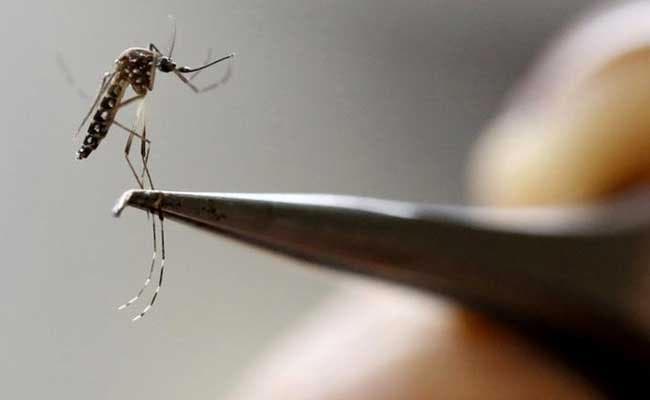
Zika, a tropical virus that originated in Africa, causes relatively mild, flu-like symptoms -- or sometimes none at all -- in people who contract it. (Representationl Image)
Rio de Janeiro, Brazil:
Brazilian scientists said on Monday they have found the first hard evidence the Zika virus blamed for causing brain damage in hundreds of babies is carried by the Aedes aegypti mosquito.
Despite the fact that world health authorities have said for months that the mosquito species is the main vector for Zika, no Aedes aegypti carrying the virus had previously been found in the Americas.
Brazil, the country hardest hit by the Zika outbreak, has focused its efforts to contain the virus on eradicating Aedes aegypti populations, and the scientists behind the study said it was important to confirm the link between the mosquito and the disease.
The researchers, from the Oswaldo Cruz Institute, said they had found the virus in three groups of Aedes aegypti mosquitoes collected in neighborhoods in northern Rio de Janeiro state.
<div id='ndtvrelcontent'></Previously, they said, Zika had only been detected once in mosquitoes in the Americas, in a recently published Mexican study that found the virus in the Aedes albopictus species.
The Brazilian researchers collected nearly 1,500 adult mosquitoes over 10 months, around half of them Aedes aegypti. The latter were the only ones in which Zika was detected, they said.
That "reinforces the evidence that A.aegypti must be the most frequent Zika transmission vector in Brazil," they said in a statement on the institute's website, adding that they were in the process of publishing their results.
Zika, a tropical virus that originated in Africa, causes relatively mild, flu-like symptoms -- or sometimes none at all -- in people who contract it.
But since the outbreak was detected in Brazil in October last year, authorities have reported a surge in babies born with microcephaly, or abnormally small heads and brains, after their mothers were infected with the virus.
The health ministry said last Wednesday that 1,384 babies had been born with the condition and 59 had died since the outbreak began.
The World Health Organization, which has labeled the suspected link between Zika and microcephaly an international emergency, said Monday that a "massive policy failure" on mosquito control and access to family planning services was to blame for the crisis.
Zika has also been linked to neurological problems including Guillain-Barre Syndrome, in which the immune system attacks the nervous system, causing paralysis and sometimes death.
The virus can also be transmitted through sexual contact, but is believed to be spread mainly by mosquitoes.
Despite the fact that world health authorities have said for months that the mosquito species is the main vector for Zika, no Aedes aegypti carrying the virus had previously been found in the Americas.
Brazil, the country hardest hit by the Zika outbreak, has focused its efforts to contain the virus on eradicating Aedes aegypti populations, and the scientists behind the study said it was important to confirm the link between the mosquito and the disease.
The researchers, from the Oswaldo Cruz Institute, said they had found the virus in three groups of Aedes aegypti mosquitoes collected in neighborhoods in northern Rio de Janeiro state.
<div id='ndtvrelcontent'></Previously, they said, Zika had only been detected once in mosquitoes in the Americas, in a recently published Mexican study that found the virus in the Aedes albopictus species.
The Brazilian researchers collected nearly 1,500 adult mosquitoes over 10 months, around half of them Aedes aegypti. The latter were the only ones in which Zika was detected, they said.
That "reinforces the evidence that A.aegypti must be the most frequent Zika transmission vector in Brazil," they said in a statement on the institute's website, adding that they were in the process of publishing their results.
Zika, a tropical virus that originated in Africa, causes relatively mild, flu-like symptoms -- or sometimes none at all -- in people who contract it.
But since the outbreak was detected in Brazil in October last year, authorities have reported a surge in babies born with microcephaly, or abnormally small heads and brains, after their mothers were infected with the virus.
The health ministry said last Wednesday that 1,384 babies had been born with the condition and 59 had died since the outbreak began.
The World Health Organization, which has labeled the suspected link between Zika and microcephaly an international emergency, said Monday that a "massive policy failure" on mosquito control and access to family planning services was to blame for the crisis.
Zika has also been linked to neurological problems including Guillain-Barre Syndrome, in which the immune system attacks the nervous system, causing paralysis and sometimes death.
The virus can also be transmitted through sexual contact, but is believed to be spread mainly by mosquitoes.
Track Latest News Live on NDTV.com and get news updates from India and around the world

